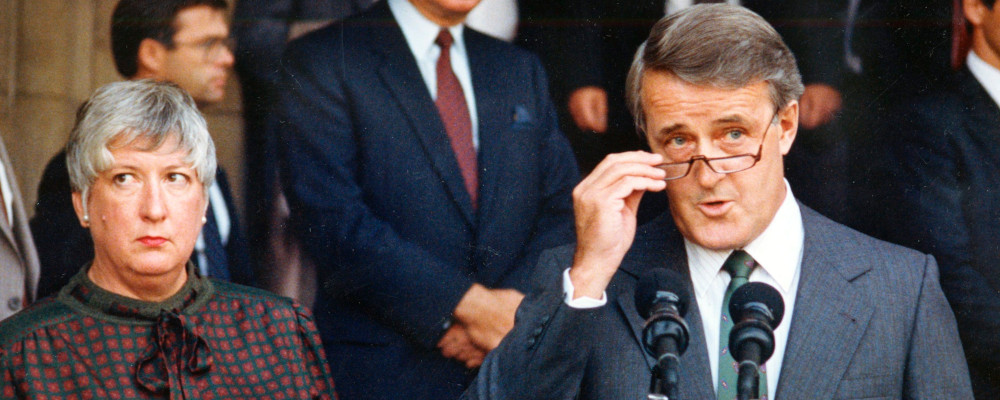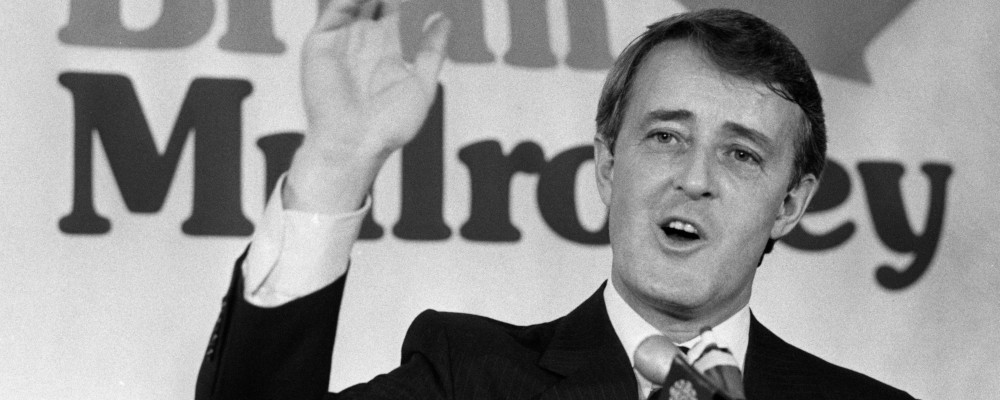Today The Hub mourns the passing of The Right Honourable Brian Mulroney, Canada’s 18th prime minister, who died surrounded by his family yesterday, at the age of 84.
One of the most consequential prime ministers in Canadian history, his ambitious record of policy reform—including fiscal and tax reform, privatization, and free trade—in many ways established a market-oriented policymaking framework that endures today.
In addition, his principled leadership on the world stage—including on South African apartheid, Canada-U.S. relations, acid rain, and victory in the Cold War—contributed to an era of heightened Canadian admiration and influence around the world.
He left his mark on the country and the world and both are better off for it.
Our thoughts and prayers are with Prime Minister Mulroney’s family.
The Hub has reached out to Mr. Mulroney’s former colleagues and friends, as well as its own network of contributors, for their reflections on his legacy. Here is what they had to say.

An exceptional leader
By Jean Charest, former leader of the federal PC Party and premier of Quebec
Mr. Mulroney was one of the greatest prime ministers in Canadian history. He was an exceptional leader. A visionary. And a statesman whose influence had a significant impact on the international stage. I remember him as generous, passionate, and deeply attached to Canada.
Our country owes Prime Minister Mulroney a profound debt of gratitude.
My family and I offer our deepest condolences to his wife, Mila, his children, Caroline, Ben, Mark, and Nicolas, and their families.
The best boss I ever had
By John McDermid, former PC MP, who served in the cabinet of Prime Minister Mulroney.
I am very sad to learn of the passing of the best boss I ever had. He looked not at the next election but rather at what would be best for Canada in the long run. To Mila, the children, and the entire family my love, condolences, and peace in this sad time. I lost a friend, and mentor and right now I mourn.
A giant
By Dorothy Dobbie, former PC MP, who served under then Prime Minister Mulroney
Brian Mulroney was a warm and genuine; a generous human being who had vision and courage. He often said near the end of his tenure that it was more important to do what was right than what was expedient. He had sincere empathy for his fellows, and he was the first one to reach out to members, friends and even the opposition if something went wrong in their lives. He would call with that deep, warm voice of his and say, “I understand. It will pass. It happens to all of us. You will be alright.” And it made you feel better.
I remember with warmth when he pushed his way through security and a crowd outside a hotel in Winnipeg to speak to David Milgaard’s mother. She was desperately trying to get justice for her wrongfully convicted son. He agreed. He gave his attorney general a poke, and he did it for the right reasons. As a result, David was eventually set free.
Brian Mulroney had a wonderful sense of humour and could laugh at himself as well as the world. He could also be devastatingly tough when needed—as a leader should be. He was never afraid to take advice and listened to what everyone said, then made his decision. Caucus meetings were the opportunity for him to hear from his backbench and he did listen, making notes, agreeing, acknowledging what he was told, and sometimes offering instruction to a minister to look into things.
When the Bloc was formed, one of the defectors told me that this was going to happen, “But,” he said, “We won’t take enough members to hurt the boss.” They loved him, and he carried them along with us as part of the team. He had that ability.
How could we forget the Christmas parties in the Hall of Honour where, in his beautiful baritone voice, he would sing Paper Doll? He treated us all as family.
He had the humility to know when it was time to step down and let the next generation step up. When he did, he held a last luncheon in the Railway Committee Room where he had his favourite dish served to his colleagues: wieners and beans! That was so Brian.
A giant on the world stage, a leader on issues such as the end of apartheid, acid rain, liberal trade, modernization of taxation, accord between English and French Canada, and settlements of outstanding Indigenous claims…the list of his accomplishments was very long.
Brian Mulroney was a good man. A very good man.
Mulroney “cultivated closeness”
By J.D.M. Stewart, history teacher of more than 25 years, author of Being Prime Minister
Brian Mulroney was as obsessed with his place in history as much as Mackenzie King was–the only difference being Mulroney’s views were not kept to a private diary. He need not have worried about his legacy. While flawed, as is the case with any prime minister, Mulroney’s achievements were arguably the most significant of any prime minister since the end of the Second World War. Many pundits will write about the free trade agreement with the United States, or the fight he led against apartheid in South Africa. But there was also his environmental record for which he was named the “greenest PM in Canadian history” by Corporate Knights magazine in 2005. That ruffled a lot of feathers at the time, but Elizabeth May, then the executive director of the Sierra Club, said that, “For a lot of us in the Mulroney years, we didn’t know it, but this was our Valhalla.”
Brian Mulroney was also a master at building and keeping relationships. This was obviously true with numerous world leaders from Francois Mitterrand to Presidents Reagan and Bush. And those connections played real dividends, whether it was during the prelude to the 1990 Gulf War or when trying to nail down an acid rain treaty. But Mulroney cultivated that closeness not only with provincial premiers, and leaders in business and the arts, but also with ordinary Canadians. I would venture to say that no other prime minister touched the lives of more citizens in this country in a personal way than did Brian Mulroney. He took their phone calls, answered their letters, or met personally with them. I was lucky enough to be one of them. Both leaders and ordinary Canadians could do well by applying some of the arts of friendship and connection practised by Brian Mulroney.

Brian Mulroney’s bold leadership on reconciliation
By Karen Restoule, vice president at Crestview Strategy
Canadians everywhere tucked into bed last night reflecting on the life and contribution of its 18th prime minister, The Right Honourable Brian Mulroney, in strengthening our country and its position in the world—and I’m no exception.
While his impact continues to be felt tangibly in many ways, as a First Nations woman born in the 1980s, it is his vision to examine and reform the relationship between the Crown and Indigenous Peoples that stands out for me.
In 1991, then Prime Minister Mulroney called for the establishment of the Royal Commission on Aboriginal Peoples (RCAP) in response to notable conflicts between the Crown and Indigenous Peoples, such as the 78-day standoff in Oka, Quebec, between Haudenosaunee protestors, police, and the army in summer 1990, as well as the rejection of the Meech Lake Accord earlier that same year by First Nations. Its timely relevance and necessity were reaffirmed by the 1995 Ipperwash and Gustafsen standoff conflicts in the summer of 1995.
The RCAP was an ambitious project that called for a new lens and framework to recognize the standing and inherent rights of First Nations through the negotiation of modern treaties and other types of governance agreements, the renewal of existing Treaties, the development of a new fiscal relationship, and other key solutions that sought to bring necessary reforms to an archaic Crown-Indigenous relationship that—to this day—limits the potential of First Nations and Canada alike.
In many ways, Mr. Mulroney had a vision for reconciliation before reconciliation was a thing.
The RCAP’s vision was clear: within two decades, it imagined revitalized, self-reliant First Nations. Yet, despite brief moments of progress—like the Kelowna Accord, the residential school apology issued by Prime Minister Harper, and others—the core transformative change Mr. Mulroney envisioned remains largely unrealized, mainly because the findings and recommendations have been ignored by successive Canadian governments.
While the time for action was indeed 28 years ago when the RCAP findings and report were released in 1996, the relevance and importance have only intensified since then as Canada continues to contend with its relationship with Indigenous Peoples. Where I come from, each of us carries the responsibility to respect and uphold the legacy of those who came before us and build upon it to further strengthen the people and community that we serve—whether we are in elected or unelected leadership roles.
With the passing of Mr. Mulroney, I remain inspired by his bold leadership. A leader who chose to make tough decisions in the face of his party and his country. A leader who wasn’t bothered to make decisions that would make him popular and likeable. A leader who chose to do the right thing time and time again. And for that, we are better for it.
Mulroney’s meritocratic climb
By Sean Speer, The Hub’s editor-at-large
Canadian Conservative politics at different points in the twentieth century was elitist, stuffy, and unsuccessful. Reading about its political defeats at the hands of Mackenzie King, one gets the sense that the patrician figures involved in the era’s Conservative Party almost wore their lack of popular support as a badge of honour. It was a sign that they didn’t relate to ordinary Canadians and vice versa.
John Diefenbaker, one of Brian Mulroney’s political heroes, wrestled control of the party away from these gatekeepers in the late 1950s, and in so doing began the process of transforming Canadian conservatism from a politics of elites to a politics of strivers that has continued uninterrupted to the present day.
Mulroney found a home in this conception of a meritocratic conservatism. He was a working-class kid from Baie-Comeau without any family connections or other material advantages. His dad wasn’t a wealthy businessman like Pierre Trudeau’s father. He was an electrician who had left school at age 14 to find work. Mulroney himself got his first job at a small grocery store when he was 10 years old and paid for his university degree by working in the summers as a truck driver, labourer, and post office sorter.
Every subsequent step in Mulroney’s life was marked by a meritocrat’s climb. He succeeded in law school, then business, and eventually politics. The people that he bested along the way had better pedigree, were better connected, and went to better schools. Mulroney beat them by simply being smarter, harder working, and more affable.
He was the CEO of a major company before he was 40 years old and won the largest parliamentary election in Canadian history by the time he was 45. This restless ambition was reflected in his government’s transformational, though at times controversial, policy agenda.
Mulroney personified the aspirational striver that represents, in my judgement, Canadian Conservative politics at its best. It’s the same impulse that drove Stephen Harper who grew up in a middle-class home to become the first three-term Conservative prime minister since Sir John A. Macdonald and today animates Pierre Poilievre who was put up for adoption by a teenage mother in his quest to become the country’s fifth youngest prime minister.
There will be a lot of discussion and debate in the coming days about Mulroney’s policy accomplishments, governing record, and historical ranking among the country’s past leaders. These are always interesting exercises. But, in my view, one of the most significant legacies is his lasting contribution to the redefinition of Canadian conservatism into a political movement of aspirants and strivers.
Mulroney’s climb to the top of the country’s political heights represents the best of our culture. There’s an onus on subsequent generations to preserve and strengthen the conditions that enabled him to aspire to and ultimately achieve the goal of becoming Canada’s prime minister.
He understood that all politics is personal
By Bob Rae, Ambassador and Permanent Representative of Canada to the United Nations, former leader of the federal Liberal Party, NDP MP and Ontario premier.
Brian Mulroney’s death has led to a wave of emotion and feeling about an extraordinary man. Many comments have focused on his ability to reach out and connect. He was better at this than any other public figure I have known and worked with. He was a man of the telephone era, and it was a device he used like a musical instrument. He understood that all politics is not just local, it’s personal. He did not wait for you to call him. He called you. Early in the morning, late at night.
Shakespeare’s Henry V is a wonderful play about political leadership, the courage, flair and inspiration that sets some apart. He speaks of “a touch of Harry in the night”, the touch on the shoulder that would provide encouragement and kindness. That was Brian Mulroney’s gift – he was not a perfect person, he was the man in the arena, ready for a fight, a good fight, and he had the goodness to understand that his vision had to extend to those on the other side.
In two mandates Brian achieved much. He saw great changes in the world, and provided leadership at home and abroad. He did not get the changes to Canada’s Constitution he wanted, but he tried nobly to do so. He was a person of vision who was also a skillful manager of people and issues.
He had flaws, but disloyalty, unkindness and mean-spiritedness were not among them.
Recommended for You

‘They’re voting with their eyeballs’: Sean Speer on the revealed preferences of Canadian news consumers

Kirk LaPointe: B.C.’s ferry fiasco is a perfectly Canadian controversy

‘I want to make Canada a freer country’: Conservative MP Andrew Lawton talks being a newbie in Parliament, patriotism, and Pierre Poilievre’s strategy

Howard Anglin: Lament for a Lament



